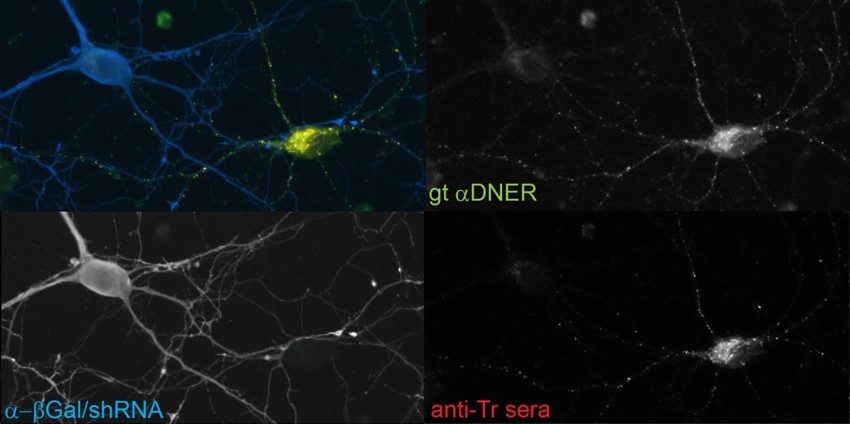Identification of Delta/Notch-like Epidermal Growth Factor-Related Receptor as the Tr Antigen in Paraneoplastic Cerebellar Degeneration. Esther de Graaff, Peter Maat, Esther Hulsenboom, Robert van den Berg, Martin van den Bent, Jeroen Demmers, Pieternella J. Lugtenburg, Casper C. Hoogenraad and Peter Sillevis Smitt Annals of Neurology 2012 71(6):815-24. PMID: 22447725 [Epub 2012 Feb 1].
Paraneoplastic cerebellar degeneration is a heterogeneous disorder characterized by subacute cerebellar ataxia and the presence of specific tumor types. A specific form of ataxia, combined with Hodgkin lymphoma, was (already several decades ago) found to be associated with the presence of auto-immune antibodies. These later called Tr-antibodies strongly react to the somato-dendritic region of neurons, but particularly of the Purkinje cells in the cerebellum.
Using immunoprecipitation of total rat brain extract with 4 anti-Tr-positive sera, followed by mass spectrometry we identified that this long sought antigen is the Delta/Notch-like Epidermal Growth Factor-Related Receptor (DNER). All 12 tested anti-Tr-positive sera reacted strongly to HA-tagged DNER expressing cells. In contrast 245/246 control sera were negative in this essay. The DNER-reacting control serum was from a patient suffering from Hodgkin Lymphoma but not ataxia, and was later confirmed to be anti-Tr positive.
We further demonstrated that anti-DNER antibodies fully co-localise with the Tr-positive sera in cultured pyramidal hippocampal neurons and that both antibodies do not show any reactivity in neurons depleted of DNER by shRNA constructs (see figure). Finally, by generating deletion and glycosylation mutant of DNER, we show that glycosylation of the extracellular domain of DNER is required for it to be recognized by anti-Tr antibodies. The identification of DNER as the Tr antigen in this study simplifies the method for determining the presence of anti-Tr antibodies in patients with subacute cerebellar symptoms. Moreover, the detection of anti-DNER antibodies in patients with subacute cerebellar ataxia warrants a thorough search for an underlying Hodgkin Lymphoma.






 Anna Akhmanova:
Cellular Dynamics
Anna Akhmanova:
Cellular Dynamics Lukas Kapitein: Biophysics
Lukas Kapitein: Biophysics Florian Berger:
Theoretical Biophysics
Florian Berger:
Theoretical Biophysics Agathe Chaigne:
Cell division dynamics
Agathe Chaigne:
Cell division dynamics Ginny Farías:
Neuronal Organelle Dynamics
Ginny Farías:
Neuronal Organelle Dynamics Martin Harterink:
C. elegans neurobiology
Martin Harterink:
C. elegans neurobiology Casper Hoogenraad: Molecular Neuroscience
Casper Hoogenraad: Molecular Neuroscience Maarten Kole:
Axonal Signalling
Maarten Kole:
Axonal Signalling Sabrina Oliveira:
Molecular Targeted Therapies
Sabrina Oliveira:
Molecular Targeted Therapies Ihor Smal: Image Analysis, Smart Microscopy and AI
Ihor Smal: Image Analysis, Smart Microscopy and AI Frederik Verweij:
Extracellular Vesicle Biology
Frederik Verweij:
Extracellular Vesicle Biology